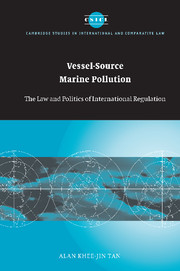Book contents
- Frontmatter
- Contents
- Foreword
- Preface
- Table of Conventions
- Table of European Union Instruments
- Table of IMO Resolutions and Guidelines
- Table of Miscellaneous Instruments
- Table of Domestic Legislation
- Table of Cases (International Courts and Tribunals)
- Abbreviations
- Part A The Regulation of Vessel-Source Pollution in its Eco-Political Context
- Part B Vessel-Source Pollution and the International Legislative Process
- Part C The Future of Regulation
- 7 Challenges and Prescriptions
- Bibliography
- Index
- CAMBRIDGE STUDIES IN INTERNATIONAL AND COMPARATIVE LAW
7 - Challenges and Prescriptions
Published online by Cambridge University Press: 24 July 2009
- Frontmatter
- Contents
- Foreword
- Preface
- Table of Conventions
- Table of European Union Instruments
- Table of IMO Resolutions and Guidelines
- Table of Miscellaneous Instruments
- Table of Domestic Legislation
- Table of Cases (International Courts and Tribunals)
- Abbreviations
- Part A The Regulation of Vessel-Source Pollution in its Eco-Political Context
- Part B Vessel-Source Pollution and the International Legislative Process
- Part C The Future of Regulation
- 7 Challenges and Prescriptions
- Bibliography
- Index
- CAMBRIDGE STUDIES IN INTERNATIONAL AND COMPARATIVE LAW
Summary
Improving Institutional Responses
One of the most pressing issues facing IMO today is the need to demonstrate its effectiveness in promulgating and implementing harmonised international regulations so as to avert unilateral action by states. Throughout this work, references have been made to the shipping community's concerns over the threat of unilateral or regional action by states or groups of states – collectively referred to here as ‘unilateralism’. Indeed, the resort to unilateral measures arrived at independent of international agreement represents a serious challenge to the decision-making authority of multilateral institutions such as IMO.
As things stand, the traditional right of the maritime interests to free navigation is already facing progressive erosion by coastal state action. If instances of unilateralism or regionalism occur with increasing frequency, not only will the delicate balance struck by the UN Law of the Sea Convention between the freedom of navigation and coastal state jurisdiction be further shaken, but there is a risk that IMO's authority will be compromised. This will have serious repercussions for the uniformity and stability of the global maritime trading system.
In the maritime arena, the systemic costs of unilateralism can be significant – these include a multiplicity of rules across different jurisdictions and an increase in transportation costs which have to be passed on to the consumer. In addition, unilateral controls by states or regions invariably have the effect of exporting safety and pollution risks to less developed regions of the world.
- Type
- Chapter
- Information
- Vessel-Source Marine PollutionThe Law and Politics of International Regulation, pp. 347 - 384Publisher: Cambridge University PressPrint publication year: 2005



